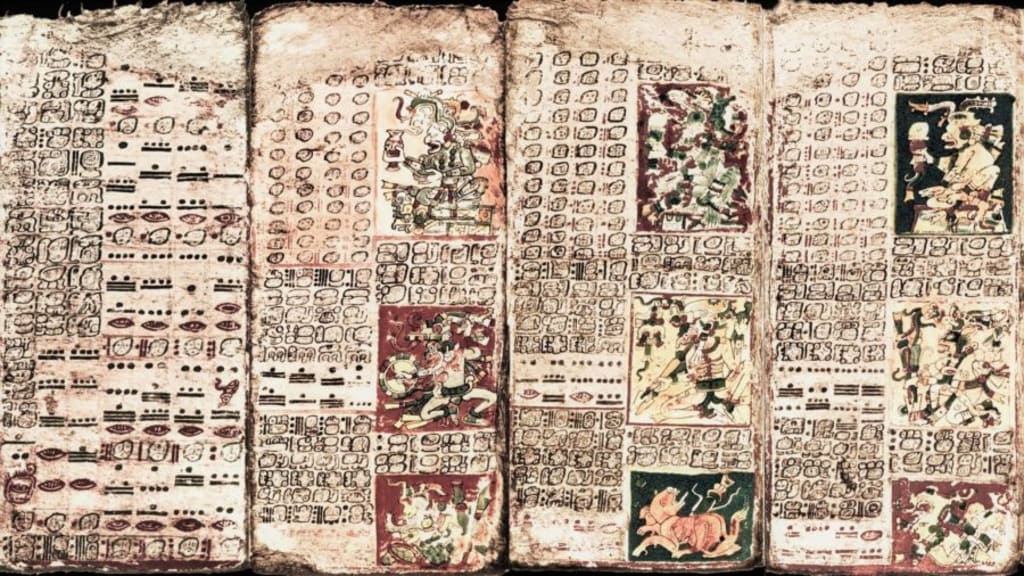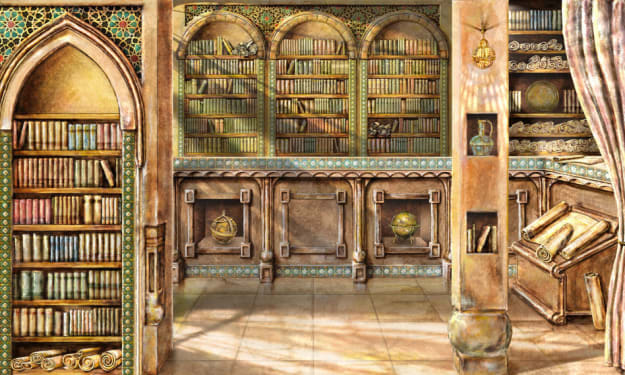CIRCLES
Of all the rabbit holes I get stuck in on the internet I don’t know any quite as powerful as Google Earth. Seeing beautiful patterns from above... Dropping down into street view... And seeing the planet in ways I would never get to see in person. So when I came across this post on Reddit, I was fascinated. It described “undocumented markings” in Algeria, in the middle of the Sahara near a location called “Tebalbalet tomb.” Visible on Google Earth. There were 22 of them, each with 12 “surrounding things”, 42 meters in diameter 420 meters apart, at longitude 4'20 East. It almost sounded like a joke. But then I copied the coordinates and I looked. There they were: identical circles in an almost perfect line. 160 kilometers from any signs of life in the world’s largest desert... in the middle of the biggest country in Africa. This is a story about the limits of what you can find out on the internet. About all the different ways of looking at the same thing. And about going all the way there. Over the course of the last 20 weeks, we filmed every step of the process as we tried to figure out one thing... What could these circles be? So this whole story starts back in September 2021 when I first saw the Reddit post. I wanted to figure out what these “markings” were and make a video out of the entire reporting process. No matter how long it took. Because the answer had to be out there. And, step one, I knew I was going to have to send some emails. For weeks, I reached out to everyone I could think of: Algerian experts, officials, tour groups... even the closest hotel, in a city called Aïn Salah. I read up on the town the circles were located closest to: Foggaret Ezzaouia. I asked the commenters on the Reddit post... and we even tracked down a Twitter account we thought was the same Will K who posted this question to several subreddits before deleting his Reddit account. I tried English and French... organizations, academics, locals... And then... I waited. But there was one easy thing to clear up first. Were these circles real? Or were they just some kind of satellite imaging glitch? So I asked a teammate who works with maps a lot: Sam, he produces our series Atlas. And he pointed me to the company that takes a lot of the satellite pictures for Google Earth: Maxar Technologies. I feel very confident that those are indeed on the ground because we see them in multiple images over multiple years. So, I know it wasn't an artifact of the processing that Google might have done with our imagery. And then a colleague of mine who has spent a decent amount of time studying this area said, “You know, this is a very rich area for oil and gas.” “This looks very similar to what we see when they're doing oil exploration.” Oil radically changed the course of Algeria’s history. "Oil from the wastelands of the desert..." "And it's believed that the Sahara is immensely rich in it." When oil and gas were discovered there in 1956, companies flocked to the region against the backdrop of a brutal decolonization war with France. Today, Algeria is one of the world’s top exporters of natural gas. What Steve is talking about here is seismic surveys where geophysicists analyze the Earth’s surface by sending shock waves into the ground. Depending on how those seismic waves bounce back researchers can tell what resources can be extracted from underground. Steve thought that, maybe, seismic pulses from a specialized vehicle could produce something like this. So, we had a hypothesis. But I wanted a second opinion. So I asked Bob Hardage at the University of Texas one of the world’s leading experts on seismic imaging. He responded by email: ”I can assure you with 100-percent confidence that the features in this imagery are not seismic arrays used in oil and gas exploration.” First, the shapes themselves weren’t right. “...there will be hundreds of thousands of receivers positioned as either a single straight line or as hundreds of parallel straight lines.” I looked up pictures from NASA of seismic surveying and you can see what he means. Second: the fact that we could even see them meant they probably weren’t a seismic survey. “... the objective is to leave the landscape like you found it." "If a seismic crew created something like these features a return visit would be made to restore the landscape.” “I have no idea what the circles in the satellite image are." "Whatever they are, the people who created them wanted those features to be permanent.” “Closeout: I don’t think we need to chat.” Thanks Bob. So I kept Googling. I found geotagged pictures from the nearest municipality, Foggaret Ezzaouia on a site called mapio.net. These old stone wells sorta looked like they could be arranged in a circle. But reverse image searches were a dead end. I didn’t know what to do next. So we looped in Vox video’s senior researcher, Melissa, to help me out. So, I was trying to find what this thing was. I don't know if you remember from his original post he calls it the Tebalbalet tomb. Do you remember that? So I found this article. This is from like 1985 — I mean, not 1985: 1885. The “Well of Tebalbalet” is at the latitude 27°20 and longitude 4°38. And that's approximately where what we're looking at is. And it says there are two circular tumuli. I had to Google that, I don't know that word. -Tumuli. What's a tumulus. Tumulus. It's an ancient burial mound. Which seems... that sounds about right. “... encompassed by two concentric mounds in the form of rings, all of great regularity." "The two rings are respectively 30 and 21 meters in diameter, from crest to crest.” So a document from 1885 said that, around this same area, there were 1) a bunch of wells, and 2) tombs with “rings of great regularity.” Now, the sketches weren’t an exact match. But they got us thinking: what if these things were actually really old? So I sent the pictures to a Tunisian archaeologist who had done research in this area. We spoke in French because of decades of French occupation in the 19th and 20th centuries French is still used in many contexts in Tunisia and Algeria. And she had a new clue. [in French] These monuments, they are without a doubt [in French] because I know Aïn Salah very well... [in French] These monuments are related to... [in French] Water. [in French] It's a desert environment, it's the Sahara. [in French] It is practically the hottest place in the Maghreb. [in French] It’s an area which is very well known for the difficulties of this heat there, and for the water harvest. [in French] So the people, they dig. [in French] It has a name: the Foggaras. Foggara. It’s the North African name for a 2,500-year-old style of irrigation system that goes by many names, but is often called a qanat. Builders dig a well at an elevated point on a slope deep enough to tap into groundwater. They then dig parallel shafts at regular intervals. These provide air flow for diggers as they create an underground channel all the way back to the main well. With a slope of 1 or 2 degrees, the channel carries water long distances powered by gravity alone. In a part of the world with barely any rain and no running rivers this technology can provide water for crops, livestock, and people year round... making human-made oases possible. [in French] It's curious, eh? This was the most promising lead yet. It explained the desert location, the circular shape, the regularity, and spacing. Even the closest municipality’s name, Foggaret Ezzaouia, is named after foggaras. And those mapio pictures of wells started to make sense. But I wanted to run it by more people who had studied qanats. Qanats are actually more than just water infrastructures. I think they are the very raison d'etre: the basis of habitation in such harsh climates. They start from outside of the city, but then they usually end up into the city or into agricultural lands. But when it came to our circles... I have no take on it, honestly. I'm looking at it now. Right. Okay, that's interesting. There's something like 20 of them in a row. Yeah. So that's definitely a foggara. So at the end of that, there should be a town. There should be an oasis or something. But if there isn't, that means that probably the water in the qanat or foggara has dried up since a long time. You should talk to Dale Lightfoot. He is the American geographer who knows everything about qanats. These are what we're looking at. I couldn't even say with confidence whether these are related to water collection. But I can tell you they're definitely not qanats. We also found these pictures. Do you think these could be what the circles are? What you're showing me pictures of here looks a lot like animal-drawn wells. I've seen these in a lot of places. To me, this is not the same thing. I think you're back to square one. Back to square one, indeed. Don't rule out space aliens. I've heard they do crazy things, too. So they might be wells, but probably not a qanat. And maybe not even related to water at all. Could we at least rule that out? That’s when Melissa found a database of oases in the Sahara. With lists of the people who help manage their water supply. Like Mohammed Brik, a farmer in Laghouat, Algeria. I don't think it was done to fetch water. Because the point of going out to look for water is to meet the needs of the population and agriculture. If there’s nothing for 160 kilometers then that’s not a valid hypothesis. Right. Because there is no village, no... There’s no village. There’s no garden. There's no oasis. There's nothing planted. There's no population. We were three months in and it seemed like our most promising hypothesis yet was probably out. Then I got an email. Back in early October, Steve Wood promised to send me high-res images from Maxar’s archive. Finally, we had them. It was the clearest look we'd had yet. And Steve believed it showed a new detail: tire tracks. If that was right, it would mean someone had been there within the last century. I kept asking people. Historians... Algerian officials... Archaeologists... And nearby residents... But after a while, I felt stuck. Like we had exhausted what we could find out on the internet. And there was nowhere else to go from here... except to the circles themselves. The longer this project went on, the more I realized that we had a choice to make. We could keep interviewing more and more people, get more and more theories and ultimately have no way to back them up. Or... we could figure out a way to get someone there... Try to film it... and then, maybe, we could know for sure. So I asked my teammate Christina — who works with journalists all over the world if she knew anyone in Algeria. And that led us to Samir Abchiche, a video journalist in Algiers. I’m about to be a dad. So no more adventures for me after this. We hired Samir to be our on-the-ground journalist... to use his expertise in the area to help us solve this mystery. The next part took months. We knew this wasn’t going to be an ordinary video shoot. We were asking him and his team to travel incredibly far to go do something potentially dangerous. But Samir took this story into his own hands. He was obsessing over every hypothesis, establishing local contacts figuring out all the details of how to get a team of people from Algiers 15 hours away by car to Aïn Salah and then deep into the desert where no roads go. Finally, Samir figured out how to make it happen. And at 7 pm on a cool February night, he and his second cameraman Abdelate... set off. And it begins. Shit. It does not begin. We can't find a hotel. They're all closed. And we're going to try Hotel El Djanoub. We have the Royal Suite. I just woke up. It's starting to get super hot. There's no service. It's yellow everywhere. But it’s beautiful. Yeah, but it’s beautiful. Which way to Ain Salah? 300 km to Ain Salah. 150 km. All we've seen is the horizon. They'd already spent 24 hours driving to get here. Now, they had to go another 160 km from Aïn Salah into the desert. But they had to pick someone else up first. Farid Ighilahriz, an archaeologist who used to lead Algeria’s national archaeological research center and managed one of Algeria’s largest national parks. He’s here to help the team identify whatever they come across. How are we going to do this without cell service? No no, I made a map. From there, they prepared. They got groceries... Bought fuel... Interviewed local officials... Planned the GPS route... And they assembled a team. A driver, an archeologist an assistant, and a desert guide. It’s right about here that I lost communication with Samir. And I wouldn’t be able to hear from him until he was back in town... With, hopefully, a definitive answer. No sandstorms, so that's good. That was making us nervous yesterday. It's still a bit risky, because nobody passes through this way. Almost nobody. And we're just two SUVs. This one is reliable, the other one, we don't really know. What’s weird is that as the crew got closer and closer... They started finding signs pointing to every one of our theories. First, tire marks from seismic survey trucks… Then, a well system... Water is always just three meters below. And finally, ancient tombs. We just saw something from far away. Yep, it's a tomb. There’s another one. So this is a tumulus. It's one of the oldest kinds of funeral monuments. And on the morning of day two, they checked the map, and… We're going roughly in the right direction. So we're 11 km from the first ones. I think we found them... False alarm... Did you see? We are approximately 500 meters from that place. Let's go! We got really excited, but they weren't there. Apparently they're just 500 meters away. We're not far. Right there, you can't see anything. You can't see anything. Right there, yeah? 10 ... 11 ... 12 .... There we go, we have all 12. After 160 kilometers of driving off-road in the desert... they were there. The 22 circles, all in configuration. They were surprisingly faint. You might not notice them if you happened to be passing by. As Samir and the team explored the area, they found the next set. And the next ones. This one's a bit clearer. The hole comes out of the ground. And a lot of them had something in common... metal wires. They’re connected. And there ... Come see up close... ...they run underground. Can I dig a little? No, no no. Not here? No. Sorry. So maybe they dug just a little bit... It's dynamite. Okay. Under these little mounds was dynamite. But here we have something else, too. We call these "attachments." It's what you'd put around a wooden crate. That's how they must have brought in the dynamite. That inscription reads SOTEMU — that’s a French acronym for the “Tunisian company of explosives and ammunition.” But one of the wires looked different than the others. It still had a yellow plastic coating. This is where it got a little scary. Is it possible... Was this one not detonated yet? Well get out of there, don't stand there. Be careful. We gotta tell everyone to be careful. Eventually they decided that the dynamite — if there was any left was probably harmless, because it would have needed a detonator to go off. So they started to dig. It must go down at least a meter. But it was buried quite deep. So, at some point, to be safe, they stopped. And then they found a clue no one could have expected. Farid? Ah, yes. Bricato... Français... "Made in France." Old cans of sardines and tuna. Here we found a little tin can. That was used for food... ...by those who worked here... ...who carried out this exploration. Oh, there’s color. Whoa... This could be the solution. So we knew what it was: dynamite, buried underground. And when Samir and the crew finally got home... I called him to hear all the details. My English, is it work for this? Yeah, it's perfect! We think that we have--we know the solution. So it's a method of searching for petroleum. But it was an old technique. At the very beginning of this journey, that’s one of the first things that anyone ever suggested. Is that it had to do with searching for petroleum. Which is crazy that it’s finally confirmed. It's the same thing that they do today just with dynamite instead of more finely tuned technology. This is crazy, this is so much more wild than I expected. Ironically, it put us right back right where we started. Seismic surveying. The circles are the remnants of surveyors looking for resources underground. This whole time, that first guess was right. But only sort of. Because Bob Hardage at the University of Texas was right when he said in that email that this doesn’t remotely resemble seismic surveying… Because this isn’t how seismic surveying works today. It’s an older technique, from the early days of surveying that uses dynamite explosions instead of vibration machines. The explosions would provide the seismic waves that would reflect and refract off of the ground underneath and that would tell surveyors that something — potentially something valuable, like oil was underground and worth digging for. The circles looked like this because of the force of those dynamite explosions happening underground. From this moment, a new question came. Who did this and when? Knowing it was a seismic survey wasn't enough. But we had one other clue from the desert to turn to... the sardine cans. I reached out to Saupiquet which seems to be the only one of these companies that still exists but they said they couldn’t identify their age by photos. So I found someone who’s been collecting sardine cans for over 40 years: Philippe Anginot. He even made a museum out of it. And I showed him the pictures. What we have here is what's called a three-body can. So these are typical cans from the 1960s. After 1960 the “Arsène Saupiquet Cannery” became the “Saupiquet Company.” When it's still labeled "Arsène," it's from before 1960. So because this can was labeled Arsène Saupiquet, we know that it was manufactured before they changed their name in 1960. Because of its 60s-style “three-body” design, we know it’s probably from the very late 1950s. Granted, this is canned food, so it’s possible that it was purchased years before it was actually eaten. But I think we can safely guess that these cans were left behind by an oil exploration crew sometime in the late 1950s. All that was left was to figure out who those people were. Before going into the desert, Samir recorded interviews with the experts that they met along the way. And there was one interview with someone who actually would have been there in the late 1950s. The father of the desert guides, who used to work as a guide himself. Peace be upon you. Here are the photos, Belhadj. I see the small holes placed like the hands of a watch. When did the drilling of [that area] take place? In 1953, the vehicles came to Djebel Beida to go to the probe. So this place existed and a company was working there. Yes, it is true. What were they doing. I know that they were digging, that's all. What was their name? I no longer remember. But I believe CREPS. I know that, at that time, CREPS was working. CREPS — a French acronym for the Sahara Petroleum Research and Exploitation Company was a joint venture between the French government and Shell. CREPS had a permit to explore and extract oil in this entire expanse of the Sahara from 1953 to 1958. Lining up that map with Google Maps shows that the circles are inside that CREPS sector. And according to these French Senate records they started geological surveys right away. Within that time, CREPS became the first company to strike oil in the Sahara, in 1956. This spurred a rush of oil companies into the region. And the struggle over control of Saharan oil became a centerpiece of France’s brutal war against Algerian Independence. "It was the end of nearly 8 years of bloodshed." "And the African nation won its freedom after 132 years." Even when Algeria won its independence in 1962 France maintained rights to Saharan oil for years to come. These circles are the scars of colonialism. They're evidence of one country’s attempts to take the resources of another. And they’re only as isolated as they are because oil wasn’t found there. Everywhere that it was, was transformed forever. So, we figured it out. These circles in the Sahara were made by French CREPS employees looking for oil. They were made by underground dynamite explosions arranged in circles along a straight line through the desert. And based on the dates of the CREPS permit, and the types of cans they left behind we can safely say they were there around 1957 or 1958. When we figured it all out, I emailed Bob. And he said this: "You have certainly done a persistent and thorough investigation." "I am comfortable with the conclusion that your features are remnants of decades-old, first generation analog recording of seismic data." "An unbelievable preservation." "Comparing 1950s seismic equipment and today's seismic equipment is similar to comparing propeller airplanes and deep space rockets." "Essentially, there is no comparison but two different worlds." "Well done." Thanks, Bob. We only know this thanks to the help of dozens of people someone’s sixty-five-year-old trash, a lot of time on the internet and a long, brave journey into the desert. Of course, a story like this could always keep going, more and more specific. But at some point to finish a story, we have to ask ourselves if the answer we have is satisfactory. And I think this one is.







Comments
There are no comments for this story
Be the first to respond and start the conversation.